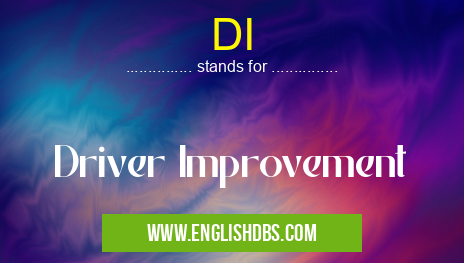What does DI mean in TRANSPORTATION
Participating in a Driver Improvement Program will help you drive safer and become more aware of the rules of the road. It can also reduce the amount of points on your driving record, which may lead to lower insurance premiums. Additionally, if you have an outstanding ticket, completing this program can sometimes result in reduced fines or other beneficial outcomes.

DI meaning in Transportation in Governmental
DI mostly used in an acronym Transportation in Category Governmental that means Driver Improvement
Shorthand: DI,
Full Form: Driver Improvement
For more information of "Driver Improvement", see the section below.
Essential Questions and Answers on Driver Improvement in "GOVERNMENTAL»TRANSPORTATION"
How does participating in a Driver Improvement Program help me?
What types of violations may require completion of a Driver Improvement Program?
If you are convicted of certain driving violations or accumulate too many points on your license, some form of driver improvement program may be required by your local Department Of Motor Vehicles (DMV). These violations can include reckless driving, speeding, failure to obey traffic laws/signs, and any other violation that is seen as an endangerment to public safety.
Who is eligible for a Driver Improvement Program?
Generally speaking, anyone with a valid driver's license who has committed certain kinds of traffic violations or accumulated enough points on their license will be required to attend a Driver Improvement Program by their local DMV. In addition, some jurisdictions allow drivers who wish to voluntarily improve their driving skills to enroll in such programs before they receive any tickets or citations.
How long does it take to complete a Driver Improvement Program?
Depending on the type and severity of the offense(s), some programs may be completed in as little as one day while others may require several weeks or months of classes and study time before successful completion. The total length depends on both legal requirements and individual skill sets.
Do I need an appointment for a Driver Improvement Program?
Yes – most driver improvement programs require that participants make an appointment ahead of time so that sufficient materials and instruction can be provided for each student. Appointments are usually taken at least 24 hours ahead of time and can often be scheduled online through the provider’s website or contact page.
Is there an age requirement for taking part in a Driver Improvement Program?
Generally speaking, most providers do not have age requirements unless specified by law (such as with Graduated Licensing Programs). All participants must possess a valid driver's license that is applicable in their state or country prior to enrollment into any given program.
Are there different types of Driver Improvement Programs available?
Yes - programs vary depending on what kind of violation occurred (if any) and the particular jurisdiction where the participant resides. Most states offer standard classroom-based courses along with online courses and even “refresher” courses for experienced drivers looking to stay sharp behind the wheel. Other specialized courses are available depending on your specific needs and desired outcome.
Are there restrictions placed upon me after successfully completing a Driver Improvement Course?
Generally speaking no; however your local DMV has final authority regarding all resolutions after completing this type of program including whether further action is needed or whether additional restrictions may apply during probationary periods. Always consult with your local DMV prior to enrolling in order know precisely what kind restrictions might apply should you successfully complete this course.
